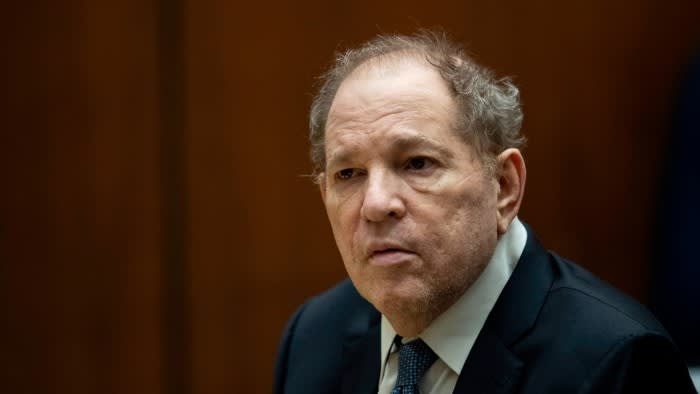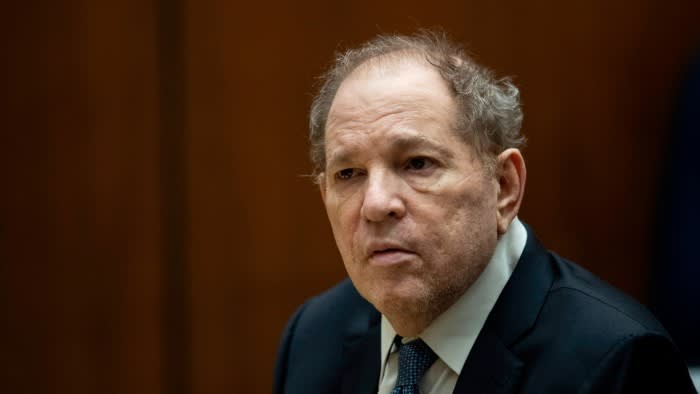
Unlock the Editor’s Digest for free
Roula Khalaf, Editor of the FT, selects her favourite stories in this weekly newsletter.
New York’s highest court has overturned Harvey Weinstein’s conviction for sex crimes and rape, and ordered a new trial for the once-powerful film mogul whose reported abuse of women fuelled the #MeToo movement.
Weinstein was first convicted in New York in February 2020 and sentenced to 23 years in prison. He had appealed against the verdict, citing, among other issues, damning testimony of alleged sexual assault given by women who were not part of the case that may have unlawfully swayed the jury.
The New York Court of Appeals in a 4-3 decision on Thursday agreed with Weinstein that the prosecution should not have been allowed to use such allegations to establish a “propensity for criminality”.
It concluded that the trial judge, James Burke — who has since left the bench — had “erroneously admitted testimony of uncharged, alleged prior sexual acts against persons other than the complainants of the underlying crimes”.
The appeals court ordered a new trial. The decision does not affect Weinstein’s 2022 conviction on charges of rape and other sex crimes in California, for which he was sentenced to 16 years in prison.
A spokesperson for the office of the Manhattan district attorney, which brought the original case, said: “We will do everything in our power to retry this case, and remain steadfast in our commitment to survivors of sexual assault.”
Explosive allegations against the film producer were first published in The New York Times and The New Yorker in 2017. They sparked a reckoning in Hollywood, ousting dozens of powerful executives over misconduct claims, including former CBS chief Les Moonves and Pixar cofounder John Lasseter.
The New York jury’s 2020 verdict against Weinstein was viewed as a landmark legal victory for the #MeToo movement aimed at holding powerful men accountable for sexual abuse and harassment. Activist groups such as the Times Up organisation described it as a “historic moment” for women’s rights. The then-Manhattan district attorney Cyrus Vance said the verdict “turned the page in our justice system on men like Harvey Weinstein”.
The six-week trial — which culminated just a couple of weeks before the Covid-19 pandemic shut down the US — was marked by graphic and emotional testimony by women alleging that Weinstein had preyed upon them, cornering them in hotel rooms and bathrooms. Court was once adjourned early because one accuser appeared to have a panic attack on the witness stand.
The charges on which Weinstein was convicted in New York were based on two alleged incidents: raping Jessica Mann, an aspiring actress, in 2013 and forcing oral sex on Miriam Haley, a production assistant, in 2006.
He was acquitted of the most serious charges against him: predatory sexual assault and first-degree rape.
Three women who were not named in the criminal case against Weinstein testified against him during trial, detailing unwanted sexual advances against them by the former Hollywood power player.
According to the ruling, one woman said she had met Weinstein in a Manhattan nightclub, who later lured her to a hotel room and told her she would “never make it in this business” unless she had sex with him.
Another said she met Weinstein when working as a cocktail waitress, was asked to meet the mogul at his apartment, and sexually assaulted.
The third woman, who met Weinstein in Los Angeles, said she had been invited over to his house ostensibly to discuss a film script, when she was led into a bathroom in which the producer masturbated in front of her.
New York courts sometimes allow evidence of former acts to be presented, in order to establish the defendant’s credibility, or lack thereof.
The jury in this case was instructed that the evidence by the three women “must not be considered for the purpose of proving that the defendant had a propensity or predisposition to commit the crimes charged”.
But the appeals court’s majority said the effect of their testimony “was to bolster their credibility and diminish defendant’s character before the jury”.
In a dissenting opinion, Court of Appeals judge Madeline Singas said the decision by her co-jurists meant that henceforth “juries will remain in the dark about, and defendants will be insulated from, past criminal acts”.
She added that “ultimately, the road to holding defendants accountable for sexual assault has become significantly more difficult”.
Read More: World News | Entertainment News | Celeb News
FT










